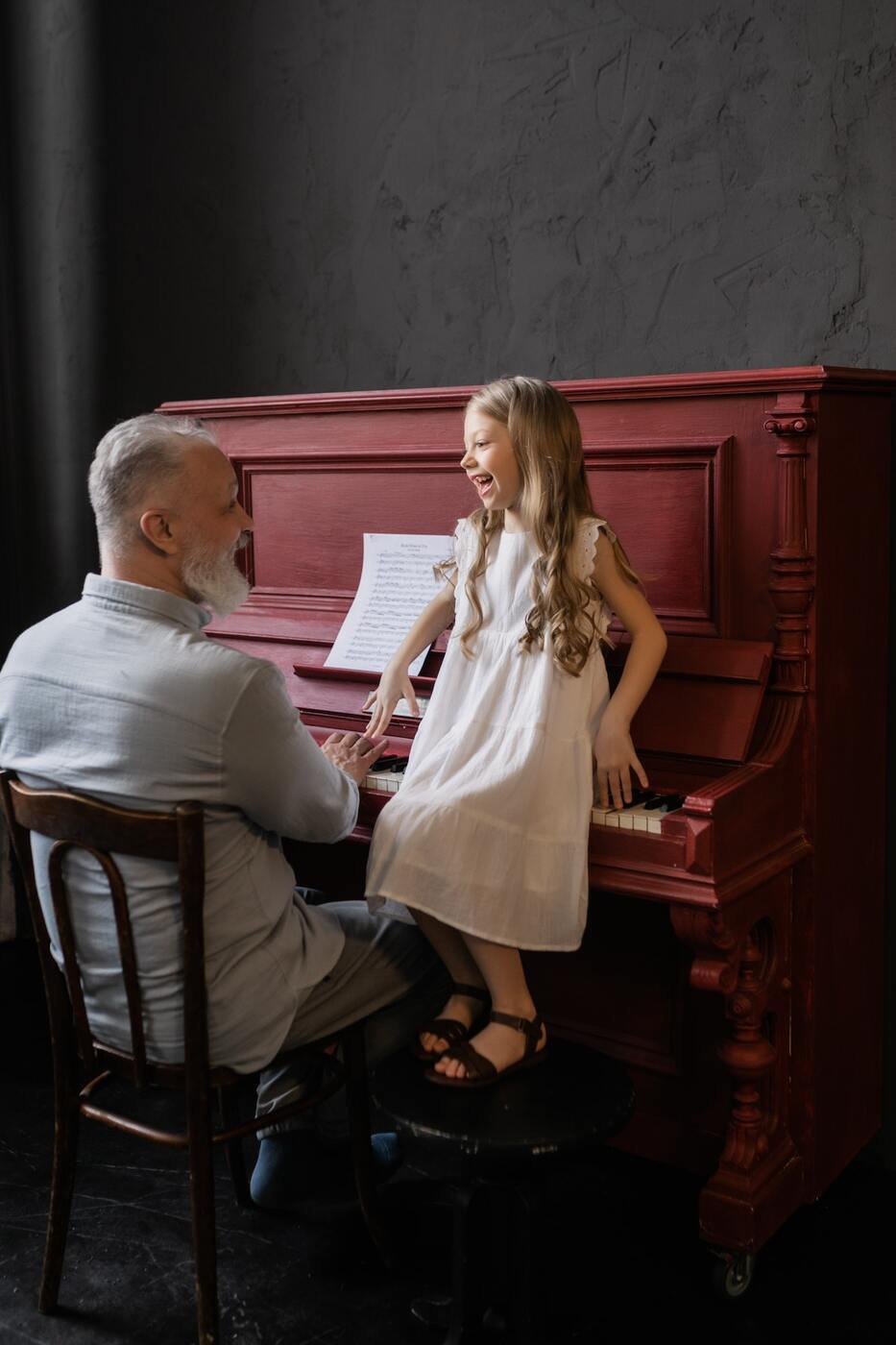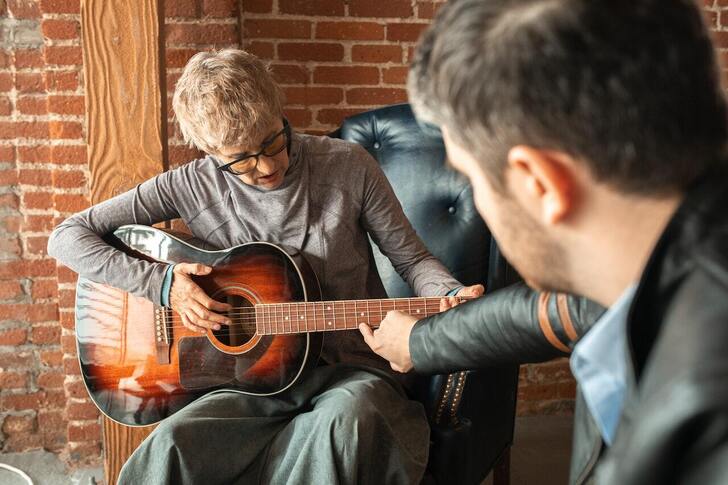Learning a musical instrument - it’s one of those skills that most people have an urge to master, yet rarely get around to doing; the intricacies of modern life somehow always seem to get in the way.
So really, it’s little surprise that over 60s are one of the main age groups that actually dedicate a good portion of time to learning musical instruments & in turn, possess some of the greatest musical skill! However, that’s not stopped people (of all ages) from questioning whether there’s some sort of theoretical age-cap on when you can learn a musical instrument. A short Google search or scroll through Quora confirms that.

More to the point, in an effort to answer this question once & for all, we spoke with a musical instrument expert by the name of Alex Harrison - editor of music review site, Music Lowdown - to discover if it is ever too late to learn a musical instrument, or whether all of this unsurety is nothing more than a man made myth.
Does age matter when playing a musical instrument?
According to Alex, no.
Age doesn’t matter when playing a musical instrument. If anything, it could actually be a major benefit: “Learning music depends on a whole load of different factors, from your creative ability & internal rhythm, to the extent of your problem solving skills & whether you can control your nerves on stage. Skills that I would argue all improve with age.
“Plus, many of the benefits you get when playing/ listening to music could be said to actually benefit seniors in the long run.”
To back up Alex’s claim, we looked deeper into the benefits of learning to play a musical instrument regardless of age, & here’s what we found…
- Music boosts mental health - According to research by the University Of Cambridge, playing &/ or listening to music (especially specific genres & styles) can actually serve as a form of therapy. Listen to lively Hip Hop music, & many people experience what’s known as a therapeutic release, as the music causes serotonin levels in the body to spike! Serotonin being the mood-enhancing chemical in the brain that works to null levels of both depression & anxiety. Similar benefits are also said to be true for listeners/ those who play Classical music, which is said to also reduce the release of a hormone called cortisol. The culprit behind many anxiety spikes!
- Music promotes physical health benefits - Learn to play music & you could go as far as to say that you gain more control over the physical wellbeing of your body. Something that comes back to how Classical tunes in particular have been proven to not only slow down heart rate & decrease blood pressure, but to also help against memory loss & slow down the brain’s aging process!! Something that even has potential to lower the likelihood of dementia & Alzheimers disease.
- Not all famous musicians start young - Looking back at some of the greatest musicians of all time, quite a few actually started their professional career in the industry at an old age. Seasick Steve for instance, only really became mainstream around the age of 65 & the group Garbage had their first (of many) hits, when their band members were in their late 30s/ early 40s. Even the icon that is Adrea Bocelli wasn’t discovered until he was 31.
- Music is the gift that keeps on giving - While learning a musical instrument might not make you famous, it could be the reason a friend/ member of your family goes on to forge a career in the industry. For instance, it was David Bowie who encouraged the iconic Noel Gallagher to put himself out there for the world to see. Much the same as Nile Rodgers was inspired to pioneer Funk music because of the musical talents of his immediate family.
3 ways to speed up the process of learning music
It’s no secret that in today’s fast-paced world, speed is a major focus.
So while we were speaking with Alex, we also asked him for what he would consider to be the best tips for anyone looking to learn a musical instrument fast. Here’s the 3 pointers he gave us…
- Immerse yourself - According to Alex, one of the easiest ways to learn a musical instrument fast, is to make it part of your routine. He told us: “As much as everyone needs their creative space, the main hack to learning an instrument fast, is to simply remain consistent. Just as with business & relationships, consistency is the key to learning an instrument fast. Make learning music a permanent part of your life & you’ll be hard pushed not to see results!”
- Don’t get knocked by failure - Another nugget of guidance Alex mentioned was the fact that failure is not something to be afraid of. In fact, it’s actually something he’d encourage you to seek out: “Ask me & failure is given a bad rep. Everyone assumes that there’s one golden way of playing a song when in actual fact - there isn’t; if there was, there would never be such thing as a remix. Music just like any creative subject is entirely subjective, so don’t be afraid to experiment. Because the more you do, the more adaptable you become, which ultimately helps to build a greater relationship between you & your instrument. Something you need to do if you’re looking to learn music at pace!”
- Invest in a qualified teacher - We also questioned Alex about whether getting a music teacher is a worthy investment. Here’s what he had to say: “If you have the money to hire a music teacher, go right ahead, but… be sure to pick one with experience. Because just like how reading the mistakes of a famous businessman can give you the head start in business, learning with a teacher who’s played every song in the book, can have much the same effect. Yes, it might cost money, but in exchange you’ll save a great deal of time & headache. Plus, we don’t get enough social interaction these days, so it also doubles an excuse to socialise.”
Average learning times for specific instruments
Upon talking with Alex, it was clear that the time it takes to learn an instrument comes back to a multitude of factors, including…
- A player’s natural ability/ whether they play another instrument already
- The time they invest into practice each day
- Their overall attitude towards learning
- The quality/ difficulty of their instrument
However, he did leave us with a benchmark of what the typical player can expect. Usually for a complete beginner, it’s expected to take around 2 years to go from novice to Grade 1 & then take an average of 1 year extra per subsequent grade.
So to reach the highest piano grade in the UK (Grade 8) would in theory, take about 10 years to accomplish. Saying that though, with most instruments it’s said that Intermediate level would be around Grades 4 & 5. So to become a proficient player, you’d only really be looking at about 5-6 years of practice.
What are some of the hardest (& easiest) musical instruments to learn?
There’s no shortage of musical instruments out there. So when it comes to choosing which one you should start learning, you could be left scratching your head.
Thankfully though, Alex was kind enough to give us a rundown of what he considers to be some of the easiest instruments to play, as well as some of the most challenging…
Some of the easiest instruments to play…
- Harmonicas
- A recorder
- Semi-weighted keyboard
- Singular drums - Djembe’s/ Cajons
- ¾ acoustic guitars/ ukuleles
Some of the most challenging instruments to learn…
- 88-key fully-weighted grand piano
- Electric guitar (including pedals & amps)
- Full size drum kit, with cymbals
- Violins - especially Stradivariuous
- French Horns
- The Oboe
Where to start?
Understanding how to choose the right musical instrument isn’t easy. So while we were chatting, we posed Alex the following question…
If you were a complete beginner looking to learn a musical instrument, which would you choose? And why?
He responded with: “Being me, I wouldn’t go for any instrument that’s labeled as easy. Life’s all about challenges & as much as each instrument is great in its own right, I’d want to distance myself from everyone else. Something to bear in mind, if you’re thinking about learning music to go commercial.
“If this is you, before committing to an instrument, do your research. If there’s a strong demand for what you play, you stand a good chance (once you become more proficient) of being able to make music your full-time career. Much the same as if you master a niche instrument incredibly well. So if this was my aim, I’d avoid guitars & pianos (because everyone plays them) & go for something more niche like an Alto Sax or a Violin. I’ve always had a soft spot for Paganini.
“But, if I was a complete novice & just looking to play casually & become more ‘in-tune’ with my musical self, I would be more tempted by the likes of recorders & djembe drums. Yes, they’re incredibly simple & usually don’t lead to any form of professional career, but as a starting point, they do make for a fantastic induction into music.”
“In the end though, the best place for you to start is not for me to say. Fact is, it all comes back to what you want to accomplish by playing an instrument - international stardom, or just to add another creative string to your bow.”
Keywords: Learning, Musical Instrument, Over 60s, Age-cap, Alex Harrison, Music Lowdown, Mental Health, Physical Health Benefits, Famous Musicians, Gift that Keeps on Giving, Immersion Yourself, Failure is Not Something to be Afraid of, Invest in a Qualified Teacher, Average Learning Times for Specific Instruments Hardest & Easiest Musical Instruments to Learn
Source: Story.KISSPR.com
Release ID: 481096

